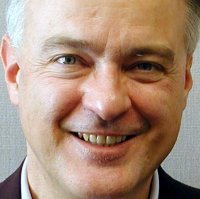Fifty years ago, gays were still dying in camps
by Andy Lang
Gay People's Chronicle (Cleveland, Ohio)
June 9, 1994
Fifty years ago, they were still dying in German prisons and concentration camps.
American, British and French troops were striking into Normandy. The Red Army was driving toward Warsaw. The Nazi empire was crumbling at its edges—but in the interior of Germany, the industrial machinery of the SS penal system was still operating at full speed. The Allies would not reach the gates of Dachau, Buchenwald and Sachsenhausen until the following spring. Thousands of men imprisoned for "crimes against nature" would not live to see the day of liberation.
Nazi eugenic theory condemned homosexuality as "racial treason." In 1927, the man who would become Hitler's first Minister of the Interior, Wilhelm Frick, warned that "men practicing unnatural lechery between men must be prosecuted with utmost severity." In 1929, the racist philosopher Alfred Rosenberg denounced homosexuality as a Jewish conspiracy and promised that a future Nazi state would criminalize homosexual relations: "We will punish them by banishment or hanging."
The Nazis made good on their promises when Hitler seized power in 1933. The Gestapo compiled dossiers on gay men and arrested them by the hundreds. In the color-coding scheme for Nazi prisoners, German gays wore a pink triangle.
But the American Jewish Committee reports that only one in four Americans knows that German homosexuals were murdered in Nazi concentration camps. Attempts to tell the story of the Nazi campaign to exterminate gays have enraged both Christian and Jewish fundamentalists. In May, Jewish gays were punched and kicked as they tried to chant the Mourner's Kaddish—the traditional Jewish prayer for the dead—at the Yad Vashem Holocaust Memorial in Jerusalem. One of the assailants shouted: "Don't touch me! You are full of shit and AIDS!"
Most German gays who survived the holocaust were silenced by postwar persecution, says Dr. Klaus Mueller of the United States Holocaust Memorial Museum in Washington, D.C. Unlike the Nuremberg laws that deprived German Jews of their civil rights, the victorious Allies never nullified Paragraph 175—the German anti-homosexual law. "Gays were subject to arrest under Paragraph 175, and West German police even used Nazi records to organize mass arrests of gay men in the 1950s and 60s. In some cases, gay prisoners were sentenced to longer jail terms because they had already served time in Nazi prisons."
Paragraph 175 remained in force in West Germany until 1969.
Courts in the postwar Federal Republic of Germany refused to classify homosexuals as victims of Nazi racial terror, Mueller says. Not one SS prison guard or camp official faced trial for the murder of gay men.
Mueller spoke May 21 at the Hillel Center on the Case Western Reserve University campus in Cleveland, Ohio. The event was sponsored by three lesbian/bisexual/gay religious organizations in Cleveland: Congregation Chevrei Tikva, Liberation United Church of Christ and Lutherans Concerned.
The Nazis believed homosexuality was a crime both against nature and the state, Mueller said. SS leader Heinrich Himmler "argued that every German man had a racial duty to expand Germany's population—particularly to beget the soldiers needed to fight future wars of conquest," Mueller said.
In a secret speech to SS cadets in 1937, Himmler described homosexuality as "an error of degenerate individualism that is contrary to nature."
"[N]ations with many children can gain supremacy and mastery of the world," he said. "It is essential for a nation to guide sex in the right direction."
Himmler dreamed of a racially pure German nation cleansed of homosexuals, Jews, Gypsies and the disabled. As supreme police commander and organizer of Germany's vast network of forced-labor camps, he had the power to translate his dream into reality.
Gays swept into the machinery of Himmler's police state died from the same conditions that killed other prisoners: disease, starvation, beatings, torture and hanging. Some were castrated to "cure" their homosexuality. In the Sachsenhausen camp near Berlin, gays were assigned to special labor detachments designed to work the prisoners to death. In Buchenwald, medical experiments on gays killed several inmates.
No one knows the exact number of gay men held in Nazi prisons and labor camps. Until recently, Holocaust documentation centers refused to count the number of homosexual prisoners. The survivors "were conditioned to be silent," Mueller says. "They internalized feelings of shame, believing that somehow they were responsible for their own persecution." Only in the past few years have the aging survivors begun to tell their stories.
Even less is known about the fate of lesbians in Nazi Germany, Mueller says. Paragraph 175 did not criminalize lesbian behavior—an oversight Mueller attributes to Nazi contempt for women in general. "Some Nazi officials believed lesbians could still be useful as breeders for future German warriors," he said. But the Nazis persecuted lesbians and destroyed their institutions. Lesbians, like gay men, were forced to conceal their identity during the Third Reich.
At the time this article was published, Andrew Lang was a reporter for United Church News, a newspaper published by the United Church of Christ.



0 Comments:
Post a Comment
<< Home